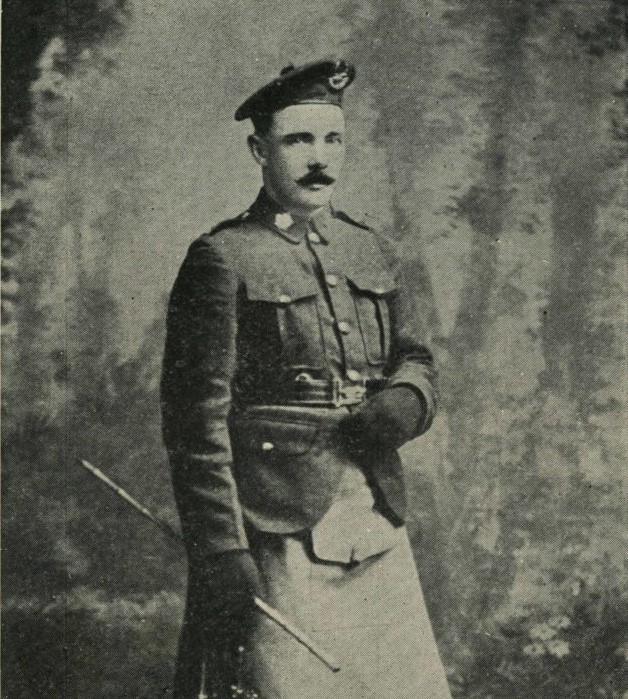Pte
Charles Samuel Bannell
Information about birth
|
Date of birth: 10/10/1883 |
|
Place of birth: Liverpool, Lancashire, England, United Kingdom |
General information
|
Last known residence: Port Alberni, British Columbia, Canada |
|
Profession: Baker / Poet |
|
Religion: Church of England |
Army information
|
Country: Canada |
|
Force: Canadian Expeditionary Force |
|
Rank: Private |
|
Service number: 1015935 |
|
Enlistment date: 24/11/1916 |
|
Enlistment place: Vancouver, British Columbia, Canada |
|
Units: — Canadian Infantry, 72nd Bn. (Seaforth Highlanders) (Last known unit) |
Information about death
|
Date of death: 30/10/1917 |
|
Place of death: Heine House, Passchendaele, Belgium |
|
Cause of death: Killed in action (K.I.A.) |
|
Age: 34 |
Memorial
|
Ypres (Menin Gate) Memorial Panel: Panel 18 - 28 - 30. |
Points of interest 4
| #1 | Place of birth | ||
| #2 | Last known residence | ||
| #3 | Enlistment place | ||
| #4 | Place of death (approximate) |
My story
Charles is one of the hundreds of thousands of Britons who emigrate to Canada at the turn of the century. In search of a better future, he ends up in British Columbia.
In order to make ends meet, he takes on various jobs. He works as a bartender, a cook and as a baker. But Charles’ true passion is writing. Especially poetry. Several of his poems are even published in the local newspaper.
At the outbreak of the war, Charles writes some rousing nationalist poems. As an enlisted man with the Seaforth Highlanders of Canada, his triumphalist tone soon gives way to a more down-to-earth look. When his unit moves to Flanders, there is no longer any question of any ecstasy. Charles' fiery pen is extinguished in the boggy plains of Passchendaele.
On the 30th of October 1917, the Seaforths take the German stronghold of Crest Farm, the key to Passchendaele. The German artillery soon retaliates. Barrage after barrage comes down on the Seaforths with great precision. As if the Germans are trying to level the difference in height between Crest Farm and Passchendaele.
Charles, is a Battalion scout. In company with two other scouts he finds shelter in a trench. When the artillery fire dies down, no trace of the three could be found, as the trench where they were in was blown in. Nothing further was heard of them until information was received about four months later that their bodies had been recovered and buried.
In order to make ends meet, he takes on various jobs. He works as a bartender, a cook and as a baker. But Charles’ true passion is writing. Especially poetry. Several of his poems are even published in the local newspaper.
At the outbreak of the war, Charles writes some rousing nationalist poems. As an enlisted man with the Seaforth Highlanders of Canada, his triumphalist tone soon gives way to a more down-to-earth look. When his unit moves to Flanders, there is no longer any question of any ecstasy. Charles' fiery pen is extinguished in the boggy plains of Passchendaele.
On the 30th of October 1917, the Seaforths take the German stronghold of Crest Farm, the key to Passchendaele. The German artillery soon retaliates. Barrage after barrage comes down on the Seaforths with great precision. As if the Germans are trying to level the difference in height between Crest Farm and Passchendaele.
Charles, is a Battalion scout. In company with two other scouts he finds shelter in a trench. When the artillery fire dies down, no trace of the three could be found, as the trench where they were in was blown in. Nothing further was heard of them until information was received about four months later that their bodies had been recovered and buried.
More information 2
|
Commonwealth War Graves Commission Database https://www.cwgc.org/find-records/find-war-dead/casualty-details/921966 |
|
Namenlijst (In Flanders Fields Museum) https://namenlijst.org/publicsearch/#/person/_id=da2b0275-9178-43f3-a8a9-e13ff65cbf7f |
